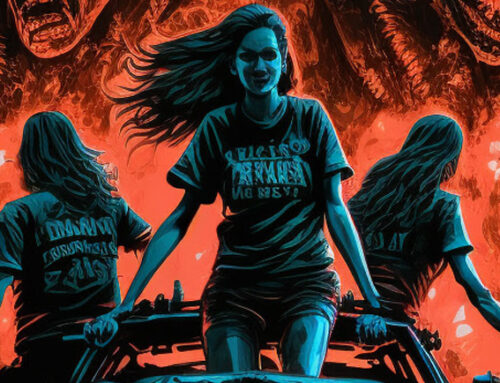A pediatrician meets an anthropology student who is researching eating habits, especially the consumption of bizarre and taboo meats. As the doctor grows more and more frustrated by her home life she turns to the student and his exotic dinner dates as a way to rekindle the friendship and connection she seems to be otherwise lacking.
Nirmali (Lima Das) is in a rut. Though her career as a pediatrician is stable and her family appears to be flourishing, Nirmali’s husband Dilip (Manash Das) is a traveling rural doctor who leaves without warning and is apparently absent for extended periods of time. Enter Sumon (Arghadeep Baruah), a Ph.D. student who studies meat-eating habits around the world. Sumon and Nirmali slowly develop a close friendship founded mostly on their shared interest in trying exotic and taboo meats. As time passes Sumon hopes for a more romantic arrangement but is repeatedly shut down, and thusly stumbles on an unorthodox way to prove his love. Meanwhile, Nirmali’s appetite has grown out of control and pushes the couple to atrocity.
Look. I’m not going to insult you, the reader, by assuming you don’t know exactly where this is going. You know it, I know it, the bottom line here is that we all know the climax of this film. Instead, I’d draw attention to the buildup to the inevitable, as it’s what I found to be unique and engaging– this isn’t a horror story disguising itself as a dramatic romance, rather, it feels like a very earnest dramatic romance which simply happens to feature an increasingly horrific plot element.
Perhaps the strongest element of AAMIS (also titled Ravening) is its stylistic tonal dissonance. The fact that we know how dark the subject matter will become makes the first hour or so of the runtime a particularly effective juxtaposition, as Nirmali and Sumon are both well-developed characters which would feel right at home in a romantic title which has nothing to do with cannibalism. The camera usually isn’t trying to build tension or unsettle, instead, it takes on the role of a mostly unbiased observer that we would see in any character-based drama. The film’s score contributes to this disarming effect in that it’s generally hopeful and upbeat if a bit morose, and highlights Sumon’s disappointment at his unrequited feelings rather than his growing obsession with Nirmali. The music is hopeful even in the final scene of the movie, which is otherwise mostly dreary.
I would also point out the strength of AAMIS‘s sound design beyond the score itself. Because the movie has so much to do with food and cooking I’m sure you can imagine the extent of Foley sound effects used to highlight the simple act of eating. Scenes in which characters eat meat are made all the more unsettling by the sounds of chewing, tearing, and popping gristle. Every scraping piece of silverware and sizzling morsel pulls the act of eating to the foreground as an element of storytelling, rather than the backdrop on which conversations occur. Fair warning: if you’re sensitive to the sounds of chewing or are squeamish with regards to sound, in general, you may not have a great time with this one, but I feel it added a lot and changed the emphasis of certain scenes in an interesting way.
If I have any complaint about AAMIS it’s with the very abrupt shift in pacing that occurs as we draw closer to the climax. About an hour into the movie there’s a bizarre and almost psychedelic dream sequence that involves the stomach and which drastically changes Sumon’s desires with regards to Nirmali. That change is perhaps the most unexpected plot element of the movie but the events which lead up to this development and those which immediately follow are given so much time to breathe that the climax feels very rushed. It’s still a satisfying ending, but it feels like we spent an hour going from point a to point b, a half hour going from point b to point c, and ten minutes sprinting from c to d.
Overall, I found the performances and the writing here to be fairly strong, but I was most impressed by the tonal subversion of what the movie presents. Is AAMIS about a woman’s descent into cannibalism? To a degree, yes, but I was left with the larger impression that this movie is a study in domestic frustration and the tendency to engage with the taboo and unknown as a way to shrug off the demands of daily life and to meet one’s needs, however abnormal they may be.
| AAMIS (Ravening) | ||
| RATING: | UR | |
| Runtime: | 1hr. 46 Mins. | |
| Directed By: |
Bhaskar Hazarika
|
|
| Written By: |
Bhaskar Hazarika
|
|







